|
February 27, 2003
Church Without Walls
Pathways ministers to those living in multihousing facilities
FAITH
By LAUREEN FAGAN
Tribune Staff Writer
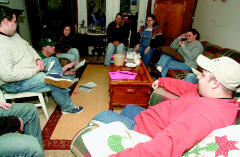 Adam Edwards, 26, foreground, listens as other members of Pathways Church discuss their faith. Adam Edwards, 26, foreground, listens as other members of Pathways Church discuss their faith.
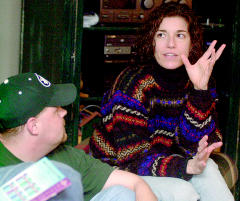
Pathways Church group leader Rob Newcomer, 26, left, listens to Erin Randolph, 34, as she describes her own spiritual journey and what her family is looking for in a faith community.
Tribune Photos/ NELLIE WILLIAMS
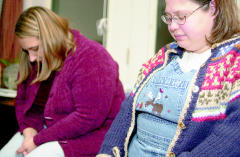
Lydia Bradford, 27, left, hosts one of three Pathways Church groups in her unit at Irish Hills Apartments. Here, Bradford and Stacey Newcomer, 29, bow their heads in prayer during their Sunday night meeting.
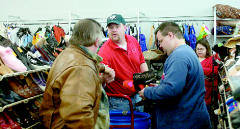
Rob Newcomer, facing, of Mishawaka, a small group leader with Pathways Church, talks to Goodwill customer Melvin Dipert, left, as pastor Kevin Buckley and member Stacey Newcomer of Mishawaka sort items for sale.
Tribune Photo/SHAYNA BRESLIN
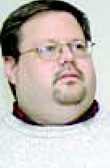
Buckley
|
SOUTH BEND -- There's a contemporary Christian song by Timothy Mark called "The Church Across the Street," one whose lyrics indict and challenge those Christians who live in the safe, isolated world of "churchianity."
"At the church across the street, the band played on, and the choir sang another verse of another lovely song," Mark sings.
"But her world was crashing in Apartment 33, and she wondered if she would ever meet ... someone from the church across the street."
It's still a popular song on Christian radio -- and its message dovetails with what the Rev. Kevin Buckley, a United Methodist Church minister, is trying to do in South Bend.
Buckley's church isn't across the street from any symbolic Apartment 33. That's because Pathways Church actually is an apartment -- more correctly, three of them -- at Irish Hills, a sprawling south-side complex.
The "church without walls" meets in three small groups in the units, occupied by Pathways participants, and leans more toward fellowship and Bible study than formal liturgy.
Its goals are aligned with the National Association for Multi-Housing Ministries and Congregations, Buckley said. Perhaps most important, Pathways welcomes nonbelievers, skeptics, people with tough faith questions, the hurting and unhappy.
"One of the things we're doing is really trying to reach folks that a lot of churches may overlook," Buckley said.
"Who lives in apartments? Mostly people in transition, whether that's a new job, or maybe newlyweds, people who are new to the area or going through a divorce."
There are lots of reasons why people live in apartments, but there's apparently one thing they have in common with residents of mobile home and RV parks, condominiums and retirement communities.
An astonishing majority of them do not attend church, according to the association's research. They're less likely to know their neighbors, more likely to be isolated. Like the woman in Apartment 33, they're unlikely to take the first step toward a congregation or feel comfortable worshipping in a traditional setting.
That's how Adam Edwards, 26, came to Pathways in Apartment 1B, the quiet home of 27-year-old Lydia Bradford -- unless it's Sunday night.
"I grew up in the church but fell off the church path," said Edwards, a married South Bend man who attends Pathways with his wife, Sara.
"I became a stout atheist, what I believed to be a true atheist," he said. But Rob Newcomer, a lifelong friend and the 26-year-old leader of one of Pathways' groups, invited him.
"Much to my dismay, God isn't nearly as bad as I thought," Edwards said as the group burst out laughing.
"The first thing I found out was that I really wasn't an atheist. I was mad at God," he said. "The things that happened to me? If God is supposed to be loving, why would these things happen to anyone?"
Edwards cautioned that he's still not completely comfortable with God and that he's taking baby steps.
But at Pathways, that's OK.
"We assume that people know nothing about Christianity," said Buckley, who pastored a traditional congregation in Lydick for 11 years before the multihousing ministry became his new assignment.
"We assume they've never read the Bible," he continued. "It's a safe place where they can come and ask really frank questions."
Several denominations -- most visibly, the Southern Baptists -- have been using the multihousing ministry model for several years, primarily in the South, Buckley said.
For the last two years, the national association has held conferences to expand the reach of multihousing congregations. This year's event will be held in Indianapolis in late May.
Buckley attended one of those conferences and returned to his United Methodist conference leaders with a new vision for "planting" a church.
"It's a departure for the denomination, and it took a lot of convincing to do this," Buckley said. "Bricks and mortar was a lot of it," he added, since there's no physical structure.
"But there's also the fact that usually, when we start a new church, we go to a fast-growing suburb where a lot of families are," he said.
Granger Community Church is a good example of that, Buckley said.
"So it was sort of hard for them to imagine," he explained. "Why plop down in an apartment community? But part of it is taking the church to where the people are."
Pathways Church also seems to be building in reverse. Many large, established congregations offer small-group ministries to their members as they become too large for individual prayer, fellowship and support.
But few churches begin with small groups as the church itself. In addition, Pathways and other multihousing ministry leaders must seek the necessary blessing of apartment managers, truck stop owners or mobile park staffers, Buckley said.
"He simply comes to me with things that they want to do," said Brenda Cline, the Irish Hills manager with whom Buckley works most closely. "Pretty much everything that they want to do is fine."
Pathways helps to create a sense of community, Cline said. Most multihousing ministries have found that on-site owners welcome that sense of stability, the association reports.
Pathways now has 25 core participants, but the words "bring your own lawn chair," an inside joke about their still-humble beginnings, still make the members laugh -- especially those who aren't comfortable in churches where they feel like a number, a downside to the Christian megachurch trend of the 1990s.
"I think the reason it's so real is that it's not me in the third row to the back, listening to a guy who doesn't know me," Newcomer said.
On the other hand, no one is required to share their feelings while in the far more visible small group.
Prayer is a simple matter of bowed heads; the offering is just a basket on the floor next to Bradford's coffee table. Prayer requests are written on small cards -- and then there's the "empty chair." One chair is always empty to represent the next person who will come to Pathways Church.
It's all very low-key, very jeans and flannel and boots, and no one is ever forced to participate or pray aloud.
"I don't think I talked in group for like two months," Edwards said.
For Erin Randolph, a 34-year-old teacher living in South Bend, Pathways is a place she's come to check out even though she's not a resident of Irish Hills Apartments.
"I'm looking for something my husband and I can have together," Randolph said. Right now, she wants something that's nonthreatening, where maybe she can just talk about faith in the car during the ride home.
"I was raised in the Catholic Church, but lately I've been rattled by the whole Catholic Church thing," she said.
"But I'm not a practicing Catholic, so I have a lot of guilt. Or maybe that means I am practicing," she said.
She was only half-joking, exploring her own spiritual state through the funny cliché of a Catholic's guilt.
Everyone at Pathways laughed.
They were really glad she came.
Staff writer Laureen Fagan:
lfagan@sbtinfo.com
(574) 235-6054
|